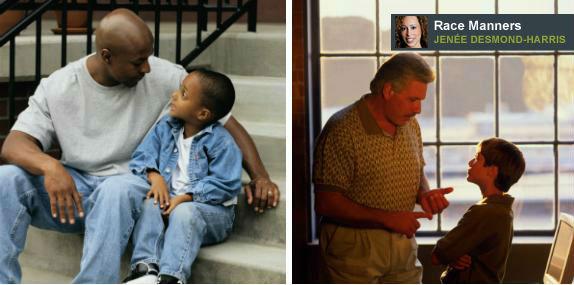
(The Root) —
“I am remarried and now have a blended family with two teenage sons. One is black (10 years old) and one white (12 years old). In light of Trayvon Martin’s death and the miscarriage of justice that surrounded it, what do I tell them? How much can children absorb at these ages and what role should race play in the discussion with each child? I have read a lot about what this means for black boys, but it feels strange and unequal to give two brothers different messages about this tragedy. Do they need to hear different things or is there a universal message? Do you have advice for how to address this with each of my children?” —Tailoring “The Talk” About Trayvon
Any time there’s a national tragedy (and I use that phrase intentionally here because I believe the entire narrative surrounding Trayvon Martin’s death is just that serious when it comes to its effect on many Americans), one of the dilemmas in the aftermath involves how to discuss it with kids.
You have an especially hard case because the takeaway from this story — the killer of an unarmed black teen who profiled him because he was black getting completely off the hook — can vary in its significance for people with different racial identities and worldviews. And the two for whom you’re responsible, even if they’re raised in the same household, will experience all the things that played into this story (identity, stereotypes, privilege, justice, just to name a few) in very different ways.
Kristen Howerton, a professor of psychology at Vanguard University (and herself a mother of black and white children) gave me a few dos and don’ts that apply pretty broadly to raising sensitive topics with kids. They’re useful as a start here.
Don’t: Talk to them before you process it yourself, while you’re still “emotionally bleeding,” she says, and “Make sure you as a parent are controlling the flow of information,” versus letting them watch unlimited (and often, sensational and divisive) news coverage.
Do: Help your boys understand that what happened to Trayvon Martin is a “possibility and not a probability.” In other words, they should both know that not all nonblack men, not even all gun owners, behave like George Zimmerman. One way to drive this point home: “Go to a protest, point out a diverse crowd rallying to support justice and equality,” she suggests.
Those are the basics. But here’s one more “don’t” that’s key in this particular case, according to Kristal Moore Clemons, a history and education scholar whose research focuses on topics including civil rights, critical race theory, social justice and education: Don’t preach colorblindness.
That’s right. There may be a temptation to minimize the role race played in this story and in the reaction to it. After all, your kids are so adorable — they’re brothers of different races and they love each other, so you don’t want to ruin their innocence, and inject the issue or racism into their life, right? Perhaps, but I sense from your question that you already know that’s unrealistic.
Read more: https://www.theroot.com/views/white-and-black-kids-different-trayvon-talks?page=0,1
